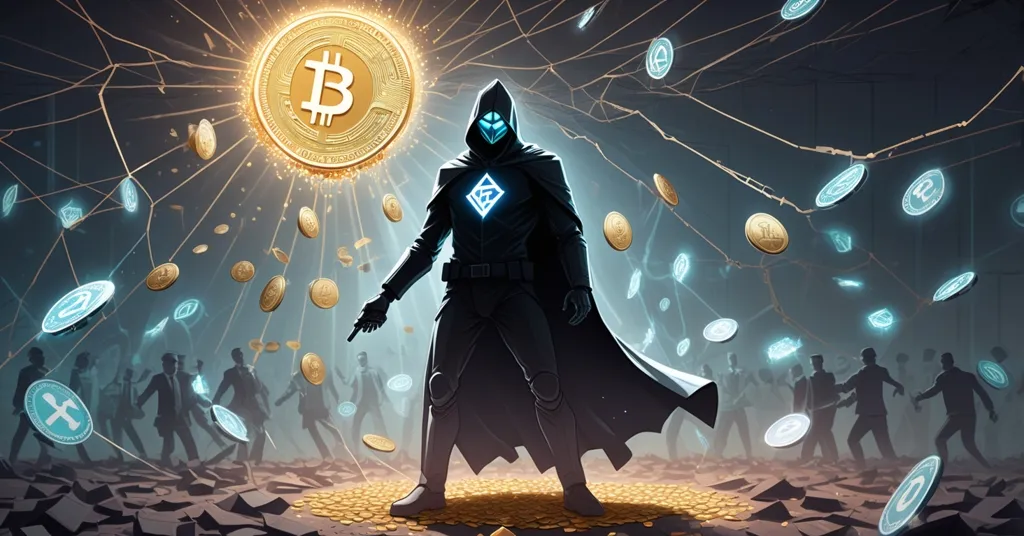Telegram Shuts Down World’s Largest Crypto Crime Hub: Over $27B in USDT Transactions

World’s Largest Crypto Crime Network Collapses After Telegram Crackdown
The notorious Haowang Guarantee, recognized as the world’s largest illicit cryptocurrency marketplace, has been shut down following a robust crackdown by Telegram, marking a significant blow to the shadowy world of crypto-enabled crime.
- Haowang Guarantee collapses after Telegram’s decisive action
- Over $27 billion in transactions processed, primarily via USDT
- Linked to Huione Group, accused of laundering over $4 billion
On May 13, Telegram took a stand against digital crime by blocking Haowang Guarantee’s non-fungible tokens (NFTs), groups, and related channels. NFTs are unique digital assets that represent ownership of a specific item or piece of content. This move effectively dismantled the infrastructure of a marketplace that had processed over $27 billion in transactions, mostly using USDT, a stablecoin designed to maintain a stable value by being pegged to the US dollar. For those less versed in crypto jargon, a stablecoin is like a digital currency with less volatility, as it’s tied to a stable asset like the dollar.
The collapse of Haowang Guarantee is deeply connected to the Cambodian-based Huione Group, formerly known as Huione Guarantee. This group has been under the watchful eye of US authorities for laundering over $4 billion in illicit funds, some of which were linked to North Korean cyber heists. The Huione Group’s activities also involved their own stablecoin, USDH, which played a critical role in their laundering endeavors. Money laundering, in simple terms, is the process of hiding the source of illegally obtained money by moving it through different accounts or businesses, making it appear legitimate.
Blockchain analytics firm Elliptic has been tracking Haowang’s operations and confirmed its status as the largest known illegal crypto market to date. Elliptic’s detailed analysis provides insight into the extensive and sophisticated nature of these criminal networks, highlighting how stablecoins like USDT and USDH facilitate high-volume transfers while evading sanctions.
“Haowang, which primarily operated via Telegram, facilitated a wide array of illegal services including money laundering, personal data trafficking, and technology tools for online crime, according to blockchain analytics firm Elliptic.”
Telegram’s crackdown extended beyond Haowang, also targeting Xinbi Guarantee, another marketplace involved in money laundering and human trafficking. Together, these two marketplaces had processed over $35 billion in USDT transactions. Elliptic describes this dual action as a “severe disruption” to the two largest illicit marketplaces hosted on Telegram.
“Elliptic, which had previously flagged Haowang’s operations, confirmed in its updated report that the marketplace had processed more than $27 billion in transactions, mainly through the USDT stablecoin, making it the largest known illegal crypto market to date.”
Despite these significant setbacks, the resilience of these criminal networks is evident. Efforts to rebuild and relaunch are already underway. Xinbi Guarantee, for instance, is attempting to establish a presence on new Telegram channels, while there are whispers of Haowang’s owners being involved with another platform, Tudou Guarantee. This ongoing battle underscores the challenges authorities and platforms like Telegram face in curbing crypto-enabled crime.
Elliptic continues to monitor over 30 similar platforms, emphasizing the persistent threat these illicit networks pose. Tom Robinson, an analyst at Elliptic, suggests that the success of these marketplaces in relaunching will depend on Telegram’s commitment to preventing their return. If Telegram remains vigilant, these criminal entities might shift to other platforms with less oversight or explore decentralized services, highlighting the cat-and-mouse nature of this digital war.
The collapse of Haowang Guarantee serves as a stark reminder of the darker side of the cryptocurrency revolution. While Bitcoin and other cryptocurrencies offer unprecedented opportunities for financial freedom and disrupting the status quo, they also provide fertile ground for criminal activities. This incident underscores the need for robust regulatory frameworks and vigilant oversight to ensure the integrity of the crypto ecosystem.
As champions of decentralization and the principles of effective accelerationism (e/acc), which advocate for rapid technological advancement, we must also confront the harsh realities and work towards a balanced solution. This solution should preserve the innovative spirit of Bitcoin and blockchain technology while combating their misuse. This is not just about policing the digital realm but also about fostering a secure environment where genuine innovation can thrive without being overshadowed by criminal enterprises.
Key Takeaways and Questions
- What was the primary reason for Haowang Guarantee’s collapse?
Haowang Guarantee ceased operations following a major enforcement action by Telegram, which blocked its NFTs, groups, and related channels on May 13.
- What types of illegal services did Haowang facilitate?
Haowang facilitated money laundering, personal data trafficking, and provided technology tools for online crime.
- How much did Haowang process in transactions?
Haowang processed over $27 billion in transactions, primarily through the USDT stablecoin.
- What is the connection between Haowang and the Huione Group?
Haowang is linked to the Cambodian-based Huione Group, which rebranded from Huione Guarantee and is under investigation for laundering over $4 billion in illicit funds.
- What role did stablecoins play in Haowang’s operations?
Stablecoins, particularly USDT and USDH, were crucial for high-volume transfers and evading sanctions in Haowang’s laundering operations.
- What other illicit marketplace was affected by Telegram’s actions?
Xinbi Guarantee, another marketplace offering illegal services like money laundering and human trafficking, was also targeted by Telegram.
- What is the current status of Haowang and Xinbi after the shutdown?
Despite the shutdown, Haowang and Xinbi are attempting to rebuild their networks and re-establish their presence on Telegram.
- How are regulators and firms responding to crypto-enabled crime?
Regulators and firms like Elliptic are increasing surveillance and imposing tighter controls on digital asset transactions to combat crypto-enabled crime.



